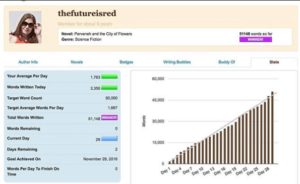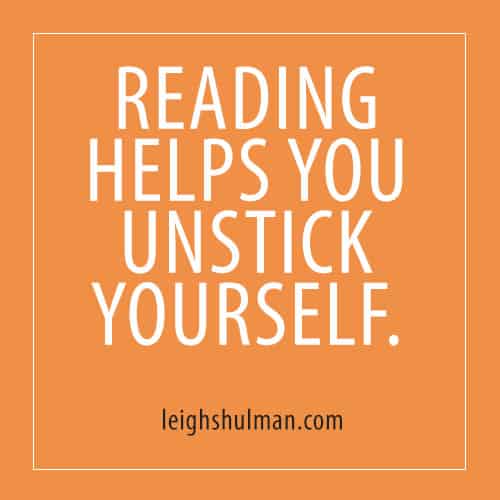I wrote my first NaNoWriMo novel in 2016. That’s National Novel Writing Month for those of you who haven’t heard of it. The goal? To write a fifty thousand word book in one month. I wrote a young adult sci-fi novel just because I wanted to write it.
God, that was fun.
NaNoWriMo is a fantastic motivator. You enter your word count every day and watch the chart levels rise and rise. You compare notes with friends and at the end, when you hit 50K words before the end of the month, you get prizes.
Even better, you end your month with a book.
I rarely write like this. I’m usually a lot more intentional with what I write. Usually, I set aside specific times every week to write, and I write as much as I can. I don’t set word goals, and I follow the advice of my writing mentor Ali.
Even if you just change one word, that’s enough for the day.
NaNoWriMo forced me to shake up the way I write and taught me to see my writing differently. I learned more about my writing process. I wrote faster and understood the benefits of setting finite writing goals.
1. The concept of “behind” is relative

When your goal is to write 50K words in a month, behind has a definite meaning. You write a certain number of words a day to keep up. Or you don’t and fall behind.
When I’m writing a short story to submit or an article I’ve pitched, I develop ideas instead of word count. What information do I want to include? What do I need to research? Have I clarified my ideas properly? Behind, in this case, has nothing to do with the length of the final draft and everything to do with content and whether or not I’ve clearly expressed my point.
I didn’t have the luxury of time during NaNoWriMo. Instead of allowing my words to marinate, I rushed toward a word goal. That meant, I wrote more in quantity each day than usual. Even when I was technically behind on my daily word count, I was still producing more.
Look at my NaNo chart above, and you’ll notice a dip about halfway through the month. That’s when I got lost in my story. I may have come close to reaching my word goals, but I didn’t feel in control of what I was writing. That’s when I took a couple days to read everything I’d written until that point. I added pieces, tweaked my outline and got my story back on track.
2. The importance of outlining and preparation before you start
Can you pants it? Sure. You can start your month with no idea what you want to write or what will happen, and yes, many amazing things arise from open writing. Even getting lost in your writing has benefits. You explore ideas you didn’t know existed. You create new possibilities.
But you can make it easier on yourself and prepare an outline first.
I wrote character sketches for each of my main characters. I wrote an outline based on the Hero’s Journey. I began writing with a final destination and a path I wanted to follow. Did it change? Yes, it did. I also got lost and didn’t know what to do next. I spent those writing days mucking around, putting words on the page that did me little good.
Having a basic plan to check in and follow helped me out of those ruts.
3. Writing fast is a good skill to develop
I’m not a fast writer, never have been. I accept that I write slowly. NaNoWriMo pushed my speed limits.
I tried to write my 2K words at the beginning of the day, when my head was most clear, but there were plenty nights I shoved my word goal on paper before falling into bed.
I assumed those last minute, hastily written words would be crap. They weren’t. Not always. Often, my late night hasty writing helped me tap into something interesting and new. Much like free writing, I was able to draw from a source I wouldn’t have known existed if I hadn’t forced myself to write quickly.
4. The difference between editing and going back to add
I warn people not to edit as you go along.
Make too many changes, and you lose track of where you want to go. You get lost.
I didn’t edit at all during NaNoWriMo. I did, however, go back to add needed parts and remove extra parts. There’s a difference between this and editing.
Adding and subtracting simply clarifies the text.
Let’s say your main character hides a key in the pocket of her coat. If you’ve written the story so that she loses her coat or leaves it somewhere, you’ll need to rewrite to make sure she has her coat when she needs the key. Another example: f you’ve included a character on page five, then on page 90, you realized the character doesn’t belong, you go back and write them out.
Editing changes the sentence level, reworks scenes and character to fit your overall story narrative and tries to smooth the overall message of the writing, but you won’t know your overall message until you finish your Shitty First Draft. That’s when you get trapped.
5. 1667 words a day is a great motivator until it’s not.
When I didn’t know what I wanted to say, it didn’t matter how many words I wrote. They didn’t stick together. The more I wrote, the more I contradicted myself. The more I had gaps, unanswered questions, pieces that didn’t fit the book. I refer to events that didn’t happen. It was frustrating. My word goal lost its panache and I didn’t want to write anymore. I got stuck.
P.S. That’s when I went back to read and re-evaluate.
6. Reading is the same as writing
Reading helped me unstick myself.
When I got stuck, I stopped to read what I’d written. I realized there were gaps and unanswered questions. I lost the storyline or wrote pieces that didn’t fit the book I was writing. Pieces conflicted. While writing, I didn’t see it. When I went back to read, it immediately became clear what I need to do.
You can also read someone else’s writing. You’ll be amazed at how fresh ideas spring from someone else’s words. Check out Austin Kleon’s Steal Like An Artist for ideas to create. Or be inspired by one of these breathtaking favorite books of mine.
7. The middle is the hardest part for a reason.
The beginning of your book is wide open. It’s fun and free and anything goes. By the end of your book, you just have to tie up loose ends and follow your plot. The middle? You’re constrained by choices you made in the beginning but you don’t quite know where you’re going. You have to balance the threads you created early on while stumbling half blindly to the end.
You’re still guessing, but it’s guessing with chains. Not enough freedom. Not enough guidance. You’re in limbo.
8. Action helps you break past those middle blocks.
Whenever you get stuck, throw an obstacle in front of your characters. Start a war. Blow up a building. Have someone break a leg or disappear. This is also known as a character pinch. When you create situation that forces your characters to do something!
9. Word goals are great, but they’re not everything.
Meeting a daily word goal has limited meaning. Just because you write two thousand or even ten thousand words, it doesn’t mean those words are quality. Just as fifty thousand words on the page doesn’t automatically form into a book. mean Or that the 50+ thousand words actually form a book.
But word count is a finite and easy way to measure your writing and keep you accountable.
10. You develop a regular writing practice.
Do you work on your book every single day? Probably not. When you spend a full month sprinting toward a clearly defined goal, you quickly see how much you can accomplish when you write regularly. Writing is easier and more enjoyable. You stop making excuses for why you’re not writing and instead finish a draft. Then you edit your drafts. Then you have something to publish.
This is how people build real careers out of writing.
11. You have to trust yourself.
NaNoWriMo showed me once again to follow this most basic tenet of writing. Trust yourself. You know your story better than anyone. You know what your characters want. You know what your book means.
All the writing advice in the world will not replace decisions you make for your writing. You are the expert in your own creation.
I’ll say it again because it’s so important. Trust yourself first.

